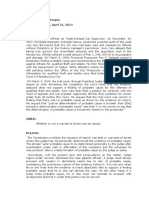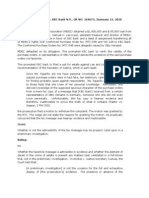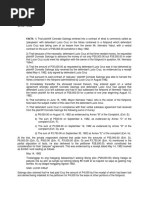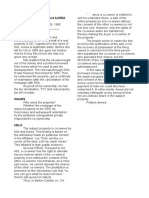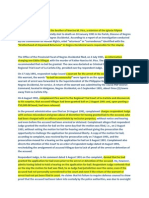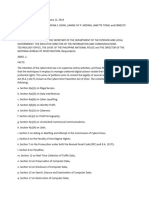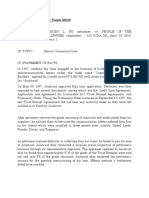Abraham vs. Recto-Kasten
Uploaded by
Toni LorescaAbraham vs. Recto-Kasten
Uploaded by
Toni Loresca298 SUPREME COURT REPORTS ANNOTATED
Abraham vs. Recto-Kasten
No. L-16741. January 31, 1962.
FLORENCIA Q. DE ABRAHAM, ALFONSO ABRAHAM,
and JEsus ABRAHAM, petitioners, vs. INTESTATE
ESTATE OF JUAN C. YSMAEL, PRISCILLA RECTO-
KASTEN, respondent.
Evidence; Examination of witnesses; Prohibition in Section
269 (c), Rule 123, Rules of Court; Waiver; Reason.—There was a
waiver of the prohibition contained in Section 26 (c), Rule 123 of
the Rules of Court, when the counsel for the administratrix
extensively cross-examined the witness on the very matters
subject of the prohibition. The reason for the rule apparently is
that a litigant cannot be permitted to speculate as to what his
examination of a witness may bring forth. Having made his
selection of one of two courses which he may pursue, he has no
right, after he discovers that the course selected is not to his
advantage, and after he has put the opposite party to the expense,
and has consumed the time of the courts in a trial of the case in
accordance with the course selected, to change his position and
make another and different selection. Such course would be unfair
both to the opposite party and to the court and should not be
countenanced in any court of justice. (IV Francisco, Rules of
Court, 876, 877, citing the case of Comstock's Adm'r vs. Jacobs, 89
VT. 133, 94 A. 497, Ann. Cas. 1918A, 465).
Laches; Elements that should be present.—In order that the
defense of laches may prosper, the following elements must be
present: (1) conduct on the part of defendant, or one under
299
VOL. 4, JANUARY 31, 1962 299
Abraham vs. Recto-Kasten
whom he claims, giving rise to the situation complained of, (2)
delay in asserting complainant's right after knowledge or notice of
defendant's conduct and an opportunity to sue, (3) lack of
knowledge or notice on the part of the defendant that complainant
would assert the right on which he bases suit, and (4) injury or
prejudice to defendant in the event relief is accorded. (Villoria vs.
Secretary of Agriculture and Natural Resources, L-11754, April
29, 1960).
Same; Same; Changes of condition detrimental to defendant
necessary in laches.—The mere lapse of time during which there
was neglect to enforce the right is not the sole basis of the rule on
laches, but also the changes of conditions which may have arisen
during the period there has been neglect. When there are no
changes of condition detrimental to the defendant, the defense of
laches may not prosper.
Obligations and contracts; Debt moratorium; Effect of
Republic Act No. 342.—Republic Act No. 342 did not lift the
moratorium on debts contracted during the war (Uy vs. Kalaw
Katigbak, L-1830, Dec. 31, 1949) but modified Executive Order
No. 32 as to pre-war debts making the protection available only to
debtors who had war damage claims (Sison vs. Mirason, L-4711,
Oct. 31, 1952).
PETITION for review by certiorari of a decision of the
Court of Appeals.
The facts are stated in the opinion of the Court.
Menandro Quiogue for petitioners.
Jose Ma. Recto and Paterno R. Canlas for respondent.
DE LEON, J.:
This is a petition to review on certiorari the decision of the
Court of Appeals in CA-G.R. No. 21222-R.
The facts as shown by the record are as follows: On
September 3, 1943, Juan C. Ysmael, obtained a loan from
Alfonso Abraham, Sr. in the amount of P12,500.00 in
Japanese currency notes, and executed a promissory note
in favor of the latter promising to pay the loan within 90
days with interest at the rate of 10% per annum. The note
was executed in the presence of Florencia Q. Abraham, the
creditor's wife, who affixed her signature at the bottom
thereof as a witness thereto. Upon the maturity of the note,
as demand was made for its payment, but the debtor failed
to pay.
On February 9, 1945, Alfonso Abraham, Sr. died. On the
other hand, Juan C. Ysmael died intestate on April 23,
1952 leaving the note still unpaid.
300
300 SUPREME COURT REPORTS ANNOTATED
Abraham vs. Recto-Kasten
On November 13, 1954, in Special Proceedings No. Q-285
for the settlement of the intestate estate of Juan Ysmael,
pending before the Court of First Instance of Quezon City,
Florencia Q. Vda. de Abraham, together with her sons,
Alfonso and Jesus, all surnamed Abraham, filed a pleading
entitled "Reclamacion" demanding payment of the amount
represented by the note. Because no regular administrator
of the estate had yet been appointed by the court, the
"Reclamacion" was not acted upon. However, as soon as
Priscilla Recto-Kasten was appointed administratrix, the
claimants reproduced their "Reclamacion" before the lower
court and the same was finally set for hearing. As agreed
upon by the parties, the reception of evidence was
delegated to a commissioner. During the hearing before the
commissioner, the counsel for the administratrix
interposed a general and continuing objection to the
testimony of Florencia Vda. de Abraham invoking the
provisions of Section 26(c), Rule 123 of the Rules of Court.
However, after the claimant had testified, he lengthily
cross-examined her on the very matters against which he
interposed a general objection.
On October 4, 1956, the lower court issued an
OrderDecree allowing the claim against the intestate
estate of Juan C. Ysmael, the dispositive portion of which
reads:
"IN VIEW OF THE FOREGOING CONSIDERATIONS, the Court
rules that the claimants established a just and valid claim against
the estate of Juan C. Ysmael, and therefore the "reclamacion"
under consideration is hereby APPROVED.
"The administratrix is hereby ordered to pay the claimants
herein the amount of P5,000.00 with interest thereon at 10% per
annum, in accordance with the Ballantyne Scale of Value for the
year December, 1943, out of the funds of the estate in the course
of her administration.
"SO ORDERED."
From the above Order-Decree, Priscilla Recto-Kasten, the
administratrix, appealed to the Court of Appeals. The
appellate court concluding that "the lower court erred in
finding that the claimants have established a just and valid
claim, and in allowing the claim—supposing it was a claim
with consideration—when the same had been barred by
prescription, estoppel and laches,"
301
VOL. 4, JANUARY 31, 1962 301
Abraham vs. Recto-Kasten
reversed the Order-Decree appealed from. Hence, this
petition for review brought by the claimants.
The main issue in this petition is whether or not
petitioners have established a just and valid claim. And if
the answer is in the affirmative, whether the same is
already barred by prescription and laches.
The record shows that petitioners have established the
due execution and genuineness of the promissory note and
that respondents failed to present any evidence to destroy
the same. Thus, in the Order-Decree appealed from, the
lower court observed:
"It is interesting to note that the promissory note executed by the
deceased was produced before the Court and marked as Exhibit
B-1, and the circumstances under which the same was executed
was extensively described by Florencia Q. de. Abraham during the
hearing, who, strikingly is one of the witnesses to the said
instrument. Much to the surprise of the Court this description
was more vividly given by the said witness not in answer to the
questions propounded by her law- yer but on cross-examination of
counsel for the administratrix, who feebly attempted to destroy
the due execution and genuineness of the said document. It is
indeed unfortunate that counsel for the administratrix did not
choose to present evidence to destroy the alleged genuineness of
the promissory note (Exhibit B-1) in support of his theory, despite
his insinuation during the course of the trial that he might try to
secure the services of an expert to determine the genuineness of
the signature of the late Juan C. Ysmael mentioned therein.
(t.s.n., p. 83) Again counsel manifested that if Exhibit B-1 is a
genuine document the same has been fully paid already, (t.s.n., p.
80), however. counsel did not present any proof to support this
contention."
It is true that Section 26 (c), Rule 123 of the Rules of Court
provides:
"(c) Parties or assignors of parties to a case, or persons in whose
behalf a case is prosecuted, against an executor administrator or
other representative of a deceased person, or against a person of
unsound mind, upon a claim or demand against the estate of such
deceased person or against such person of unsound mind, cannot
testify as to any matter of fact occurring before the death of such
deceased person or before such person became of unsound mind;"
However, there was a waiver of the prohibition when the
counsel for the administratrix extensively cross- examined
the witness on the very matters subject of the
302
302 SUPREME COURT REPORTS ANNOTATED
Abraham vs. Recto-Kasten
prohibition. (Wright v. Tinio, G.R. No. L-4004, May 29,
1952; see also Tongco v. Vianzon, 50 Phil. 698; Macfarlane
v. Green, 54 Phil. 551) It was for this reason that the trial
judge eventually overruled the counsel's previous general
and continuing objection and admitted the testimony of the
witness. Furthermore, it is difficult to believe that the
counsel's lengthy cross-examination on the prohibited
matter was merely for the purpose of establishing the
"motive, prejudices and predilection" of the witness. In this
connection, it has been said:
" x x x. The reason for the rule apparently is that a litigant cannot
be permitted to speculate as to what his examination of a witness
may bring forth. Having made his selection of one of two courses
which he may pursue, he has no right, after he discovers that the
course selected is not to his advantage, and after he has put the
opposite party to the expense, and has consumed the time of the
courts in a trial of the case in accordance with the course selected,
to change his position and make another and different selection.
Such course would be unfair both to the opposite party and to the
court and should not be countenanced in any court of justice. (IV
Francisco, RULES OF COURT, 876, 877, citing the case of
Comstock's Adm'r vs. Jacob, 89 VT. 133, 94 A. 497, Ann. Cas.
1918A, 465)".
The next issue is whether or not the claim is already
barred by prescription and laches. Under the New Civil
Code, an action upon a written contract must be brought
within 10 years from the time the right of action accrues.
(Art. 1144, par. 1). In the case at bar, the cause of action
accrued on December 3, 1943 (the date when the note
became due and demandable) and petitioners filed their
"reclamacion" only on November 13, 1954. Apparently, the
action has already prescribed, because more than ten years
had elapsed before any suit was filed. However, it must be
remembered that the provisions on moratorium had the
effect of suspending the statute of limitations from
November 18, 1944 when Executive Order No. 25 was
issued, to May 18, 1953, the date of promulgation of the
decision in the case of Rutter v. Esteban (G.R. No. L-3708)
holding such provisions no longer applicable (Rio y
Compania v. Sandoval, G. R. No. L-9391, November 28,
1956; Compania Maritima vs. Court of Appeals, G.R. No. L-
14949, May 30, 1960). Thus, from December 3, 1943 to
November 13, 1954, eleven
303
VOL. 4, JANUARY 31, 1962 303
Abraham vs. Recto-Kasten
years, eleven months and ten days have elapsed. Deducting
from this period eight years and six months, the time
during which the statute of limitations was suspended, it is
clear that petitioners' claim has not yet prescribed when it
was filed on November 13, 1954.
Respondents, however, contend that Republic Act No.
342, which took effect on July 26, 1948, lifted the
moratorium on debts contracted during the Japanese
occupation, The contention is untenable. This court has
already held that Republic Act No. 342 did not lift the
moratorium on debts contracted during the war (Uy v.
Kalaw Katigbak, G.R. No. L-1830, Dec. 31, 1949) but
modified Executive Order No. 32 as to pre-war debts,
making the protection available only to debtors who had
war damage claims (Sison v. Mirason, G.R. No. L-4711,
Oct. 31, 1952).
In order that the defense of laches may prosper, the
following elements must be present: (1) conduct on the part
of defendant, or one under whom he claims, giving rise to
the situation complained of, (2) delay in asserting
complainant's right after knowledge or notice of
defendant's conduct and an opportunity to sue, (3) lack of
knowledge or notice on the part of the defendant that
complainant would assert the right on which he bases suit,
and (4) injury or prejudice to defendant in the event relief
is accorded. (Villoria v. Secretary of Agriculture and
Natural Resources. G.R. No. L-11754, April 29, 1960)
Assuming that the first three elements are present, we do
not see how the last element may exist, for neither injury
or prejudice to respondent may occur by the allowance of
the claim. It should be emphasized here that mere lapse of
time during which there was neglect to enforce the right is
not the sole basis of the rule on laches, but also the changes
of conditions which arise during the period there has been
neglect. When there are no changes of conditions
detrimental to the defendant, the defense of laches may not
prosper.
IN VIEW OF THE FOREGOING, the decision of the
Court of Appeals in CA-G.R. No. 21222-R is hereby
reversed and the Order-Decree dated October 4, 1956 of the
Court of First Instance of Quezon City in Special Proceed-
304
304 SUPREME COURT REPORTS ANNOTATED
Union Garment Co., Inc. vs. Court of Tax Appeals
ings No. Q-285 is hereby affirmed in all respects. Without
costs.
Bengzon, C.J., Padilla, Labrador, Concepcion,
Reyes, J.B.L., Barrera, Paredes and Dizon, JJ., concur.
Bautista Angelo, J., took no part.
Decision reversed.
Notes.—Ignorance which is the effect of inexcusable
negligence in failing to gather information or knowledge of
the effect of a transaction which would have been obtained
by the exercise of diligence is no excuse for laches
(Rodriguez v. Rodriguez, L-23002, July 31, 1967, 20 SCRA
908, 918, citing Go Chi Gun, et al v. Co Cho, et al., L-5208,
Feb. 28, 1955). Thus, the following negligent acts were held
to constitute laches:
(1) filing an action in 1959 to set aside a title issued in
1914 (People's Homesite & Housing Corporation
and University of the Philippines v. Mencias, L-
24114, Aug. 16, 1967, 20 SCRA 1031).
(2) filing an action in 1962 to annul conveyances made
in 1934 (Rodriguez v. Rodriguez, et al., supra);
(3) failure of plaintiffs in an unexplained interval of 29
years to file claim or institute action for the
recovery of land (Laurel-Manila v. Galvan, L-23507,
May 24, 1967, 20 SCRA 198);
(4) filing a claim for reinstatement only after the lapse
of 17 months from dismissal (National Shipyards
and Steel Corp. v. CIR, L-21675, May 23, 1967, 20
SCRA 134).
Written extrajudicial demands, together with judicial
demands negative laches on the part of the claimant (De
Harden v. Harden, L-22174, July 21, 1967, 20 SCRA 706).
____________
© Copyright 2020 Central Book Supply, Inc. All rights reserved.
You might also like
- People v. Fabro G.R. No. 208441 July 17, 2017No ratings yetPeople v. Fabro G.R. No. 208441 July 17, 20172 pages
- (D) Samuel U. Lee vs. KBC Bank N.V., GR NO. 164673, Juanuary 15, 2010No ratings yet(D) Samuel U. Lee vs. KBC Bank N.V., GR NO. 164673, Juanuary 15, 20102 pages
- The Consolidated Bank and Trust Co. vs. Del Monte Motor Works FactsNo ratings yetThe Consolidated Bank and Trust Co. vs. Del Monte Motor Works Facts11 pages
- Go v. CA, GR 120040, Jan. 29, 1996, 252 SCRA 564No ratings yetGo v. CA, GR 120040, Jan. 29, 1996, 252 SCRA 5642 pages
- Right To Be Heard by Himself and Counsel PEOPLE VS. HOLGADO (85 PHIL 752 G.R.L-2809 22 MAR 1950)No ratings yetRight To Be Heard by Himself and Counsel PEOPLE VS. HOLGADO (85 PHIL 752 G.R.L-2809 22 MAR 1950)35 pages
- Crimpro People vs. Marti GR No. 81561 Date: January 18, 1991 Ponente: Bidin, JNo ratings yetCrimpro People vs. Marti GR No. 81561 Date: January 18, 1991 Ponente: Bidin, J1 page
- Domado Disomimba Sultan vs. Atty. Casan MacabandingNo ratings yetDomado Disomimba Sultan vs. Atty. Casan Macabanding8 pages
- Cequena V. Bolante G.R. No. 137944 April 6, 2000 Ponente: Panganiban, J100% (1)Cequena V. Bolante G.R. No. 137944 April 6, 2000 Ponente: Panganiban, J2 pages
- Issue: Is There Still A Need For Deposition of Respondent? Held: NoNo ratings yetIssue: Is There Still A Need For Deposition of Respondent? Held: No6 pages
- Nilo Mercado vs. Ca and Aurea Mercado: Owner of The Land, With My Sister Aurea."No ratings yetNilo Mercado vs. Ca and Aurea Mercado: Owner of The Land, With My Sister Aurea."3 pages
- Vallacar Transit V Jocelyn Catubig (Agas)No ratings yetVallacar Transit V Jocelyn Catubig (Agas)3 pages
- Assignement 3 - 18 Republic Cement Corporation v. GuinmapangNo ratings yetAssignement 3 - 18 Republic Cement Corporation v. Guinmapang3 pages
- Go v. CA and Star Group Resources and Development IncNo ratings yetGo v. CA and Star Group Resources and Development Inc3 pages
- Petitioners vs. vs. Respondent Menandro Quiogue Jose Ma. Recto Paterno R. CanlasNo ratings yetPetitioners vs. vs. Respondent Menandro Quiogue Jose Ma. Recto Paterno R. Canlas5 pages
- Office of The City Prosecutor 1: Kimberly LagradaNo ratings yetOffice of The City Prosecutor 1: Kimberly Lagrada3 pages
- Commissioner of Internal Revenue vs. Mirant Pagbilao CorporationNo ratings yetCommissioner of Internal Revenue vs. Mirant Pagbilao Corporation23 pages
- Bonifacio Water Corporation vs. Commissioner of Internal RevenueNo ratings yetBonifacio Water Corporation vs. Commissioner of Internal Revenue15 pages
- Capital Ins. & Surety Co., Inc. vs. SadangNo ratings yetCapital Ins. & Surety Co., Inc. vs. Sadang6 pages
- In The United States Bankruptcy Court For The District of DelewareNo ratings yetIn The United States Bankruptcy Court For The District of Deleware7 pages
- Arizona Supreme Court Adopts "Odor Unless" Standard For Probable CauseNo ratings yetArizona Supreme Court Adopts "Odor Unless" Standard For Probable Cause10 pages
- Art. 124 - 133.against Fudamental Law of The StateNo ratings yetArt. 124 - 133.against Fudamental Law of The State4 pages
- Foreclosure Fraud Shapiro Fishman Attorney General Subpoena0% (1)Foreclosure Fraud Shapiro Fishman Attorney General Subpoena10 pages
- Bersamin, J.:: Third Division Peter Bejarasco, JR., G.R. No. 159781No ratings yetBersamin, J.:: Third Division Peter Bejarasco, JR., G.R. No. 1597813 pages
- Bond v. United States - Joint Appendix in U.S. Fourth Circuit No. 17-2150No ratings yetBond v. United States - Joint Appendix in U.S. Fourth Circuit No. 17-2150424 pages
- Valeant Pharmaceuticals Whistleblower Complaint That Started It All - . .No ratings yetValeant Pharmaceuticals Whistleblower Complaint That Started It All - . .27 pages
- Tayabas Bus Company (LTB) Bound For Lilio LagunaNo ratings yetTayabas Bus Company (LTB) Bound For Lilio Laguna20 pages















